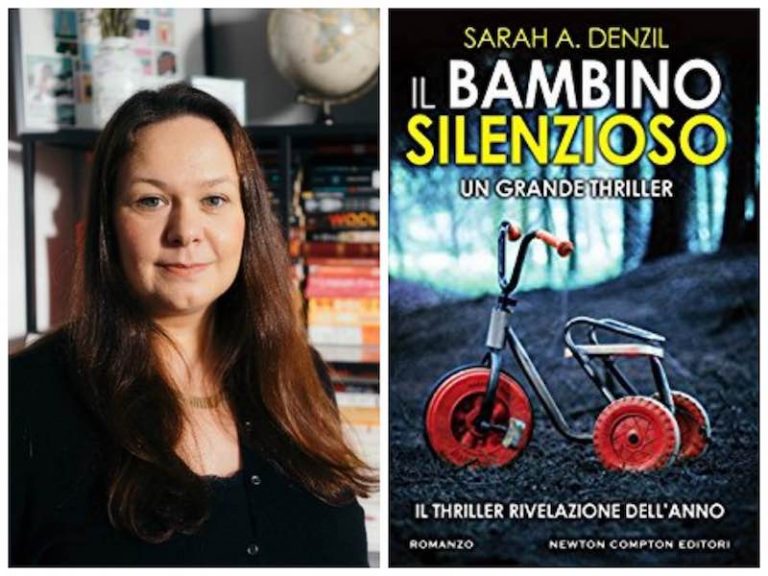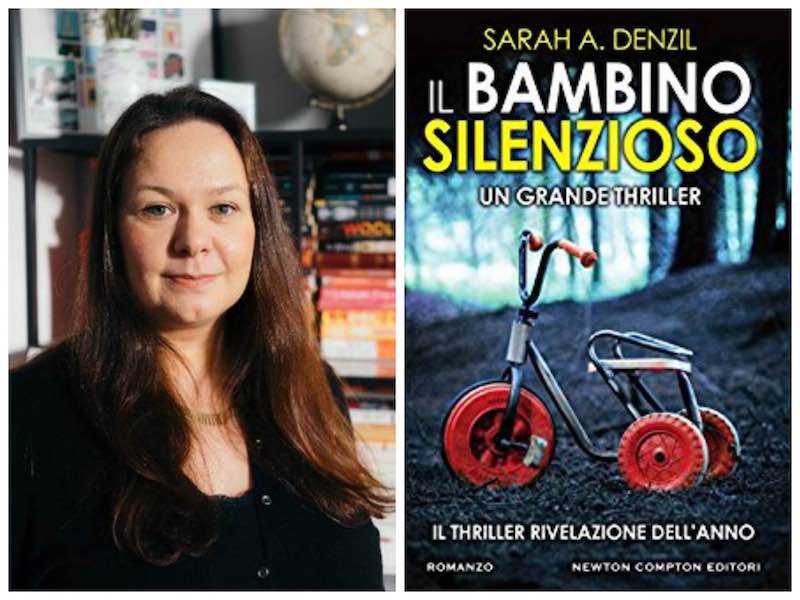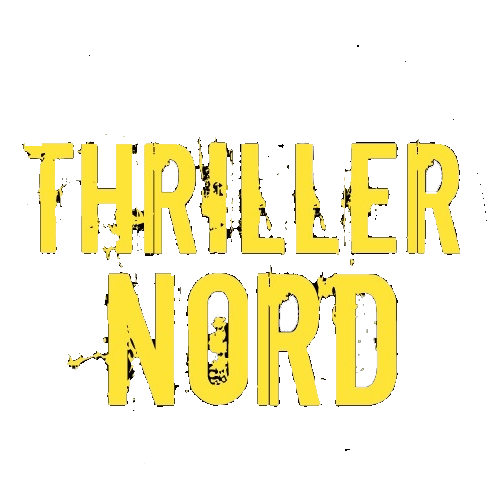A tu per tu con l’autore
A tu per tu incontra oggi l’autrice di un appassionante thriller psicologico Sarah A. Denzil. Il libro si intitola Il bambino silenzioso” e Thrillernord lo ha recensito per voi.
“Il bambino silenzioso” è un giallo-thriller di forte impianto psicologico: come è nata l’idea di scrivere questo libro?
Avevo un’immagine nella testa, di un ragazzo che di notte vagava in una foresta e attorno a questa idea ho costruito il resto del libro. Dovevo trovare una ragione plausibile per cui il ragazzo si trovasse lì e sul perché non potesse dire a nessuno da dove era venuto. Allo stesso tempo volevo scrivere di un personaggio femminile molto forte che fosse disposto a combattere per il suo bambino.
“Silent child” is a thriller with a strongly psychological connotation: how was born the idea to write this book?
I had an image in my mind of a boy wandering out of a forest one night. The rest of the book was built around that image. I had to figure out a plausible reason why the boy would be in the forest, and why he couldn’t tell anyone where he had come from. I also wanted to write a strong, female character who was prepared to fight for her children.

Come mai ha scelto di seguire il filone del thriller psicologico? C’è qualche autore dedito a questo genere che l’ha particolarmente colpita e/o ispirata per l’idea della stesura del libro?
Ho sempre adorato i romanzi ricchi di suspance, ma non sono mai stata una grande fan dei romanzi con lunghe indagini poliziesche, che sono poi stati i tipi di libri che hanno dominato il genere della crime novel per molti anni. Poi è arrivata Gillian Flyn ed ha scritto un thriller psicologico che ha rivoluzionato il genere, ho letto L’amore bugiardo e l’ho amato, così ho iniziato a leggere altri libri simili, come Non ti addormentare (S. J. Wattson), La ragazza del treno (Paula Hawkins) e La gemella silenziosa (S.K.Tremayne). L’atmosfera, i narratori inaffidabili e la suspance domestica sono stati di grande ispirazione.
Why did you choose to follow the psychological thriller’s line? Is there some Author who deals with this genre that particularly inspired you the idea to write this kind of book?
I’ve always loved suspense fiction, but I’ve never been a huge fan of police procedural books, which are the kind of books that dominated crime fiction for many years. Then Gillian Flynn came along and wrote a psychological thriller that changed the genre. I read Gone Girl and loved it, then I started to read other books in the genre, Like Before I Go To Sleep, The Girl on the Train, and the Ice Twins. The atmosphere, unreliable narrators, and domestic suspense were very inspiring to me.
In maniera molto precisa: quali fonti ha utilizzato per studiare la casistica di questi disturbi?
La situazione che sperimenta Aiden nel libro è abbastanza particolare. Sebbene guardassi documentari ed interviste a vittime di crimini similari, io dovevo sempre pensare ai mie personaggi. a come avrebbero reagito loro in quelle stesse circostanze.
In your book, beside the main case, the kidnapping’s one, you describe in detail and accurately the dynamics of post-traumatic stress disorder that affect the kidnapping’s victim: which sources did you use for this disorders case study?
The situation that Aiden experiences in the book is relatively unique. Though I watched documentaries and interviews about victims of similar crimes, I had to think about my own characters and how they would react under their own circumstances.
Verso la fine del libro, sono presenti anche riferimenti alla dinamica particolare che finisce per legare una vittima al proprio rapitore, più comunemente definita “Sindrome di Stoccolma”. Questo riferimento ci rimanda a casi di lunghi rapimenti realmente accaduti, come quello della piccola Natasha Kampusch in Austria o quello di Elisabeth Fritzl, sempre in Austria: ha utilizzato materiale riguardante queste inchieste come spunto per descrivere alcune dinamiche presenti nella sua storia?
Ho guardato dei documentari sui due casi, ma credo che nessuno possa veramente capire cosa abbiano provato Natasha ed Elisabeth durante la loro prigionia. Il mio obiettivo principale era capire come il mio personaggio Aiden, si sentisse e cosa pensasse. E’ stato rapito da piccolo e per un intero decennio ha sempre visto solo una persona. Credo che debba essere stata un’esperienza estremamente confusa e drammatica per lui.
The end of the book, you refer also to Stockholm Syndrome, the condition that causes hostages to develop a psychological alliance with their captors. This reference guide us to really happened longstanding kidnapping such as that one of little Natasha Kampusch in Austria or that one of Elisabeth Fritzl, always in Austria: did you use material dealing with these investigations as cue to describe some dynamics present in your story?
I did watch documentaries about those cases, but I don’t think anyone can truly understand how Natasha or Elisabeth felt during their captivity. My main focus was on thinking about how my character, Aiden, would think and feel. He was taken at a very young age and saw only one person for an entire decade. That had to be an extremely confusing and traumatic experience for him.
A quale fetta di lettori ha pensato mentre procedeva con la stesura di questo libro?
Penso sempre ai lettori del genere che sto scrivendo. E’ un thriller psicologico, scritto per i fans del thriller psicologico.
What sort of readers did you think about, during the writing of your book?
I always think about the readers of the genre I’m writing. It’s a psychological thriller written for fans of psychological thrillers.
“Il bambino silenzioso”, pur essendo una storia inventata, contiene anche una implicita denuncia ad una società malata e spesso alienata, che può portare le persone a compiere atti tremendi: pensa che le istituzioni potrebbero in generale attivarsi e fare di più, per evitare certe situazioni?
Il bambino silenzioso è una storia di finzione, non potrei immaginare tanti criminali che abitano in una città così piccola! Tuttavia questi crimini succedono e penso che la società potrebbe fare molto di più per i casi di problemi mentali rispetto a quanto fa tuttora. Molti bambini vengono abusati da adulti che a loro volta hanno subito violenza da piccoli, è un circolo crudele. E’ importante proteggere e fornire alle giovani vittime le terapie necessarie per guarire e vivere un vita felice.
“Silent child”, even if is an invented story, contains also an implicit complaint towards a sick and often alienated society, that can get people to commit terrible acts:do you think that institutions in general could take actions and do more so to avoid certain situations?
Silent Child is very much a fictional story. I wouldn’t imagine that it was possible for so many criminals to live in such a small town! However, these crimes do happen and I think that society could do more for mental health issues than they do currently. So many child abuse cases begin with the abuser being abused at a young age, perpetuating a cruel cycle. It’s important that young victims are protected and given therapy so that they can heal and grow up to live a happy life.
Essendo lei una scrittrice, suppongo che ami molto la lettura: le va di raccontare a Thrillernord com’è nato il suo amore per la lettura e qual è il suo autore preferito? E che ci dice del thriller nordico, è un genere che le piace?
Amavo leggere sin da bambina e spesso preferivo rimanere sola con un libro piuttosto che uscire a giocare. Ma non sono mai stata il genere di lettrice a cui piace un solo genere e si concentra su quello. Io leggo di tutto, dai classici, ai romanzi scientifici, dalle storie di fantasmi all’epic fantasy. Ho diversi autori preferiti. Leggerei qualsiasi cosa di donna Tartt, mi piacciono anche Margaret Atwood, Gillian Flynn, e Ian Banks. Mi vergogno un po’ ad ammettere che non ho mai letto un thriller nordico! Onestamente non c’è abbastanza tempo in questo momento ed io cerco sempre di tenermi al passo con quello che è più popolare tra i thriller psicologici. Un giorno finalmente riuscirò a leggere tutto ciò che vorrei.
As you are a writer, I suppose you really love also reading: would you like to tell to Thrillernord how was born your love for reading and which is your favourite Author? And what about nordic thriller in general? Do you like it?
I loved reading as a child and would often be alone with a book rather than outside playing. But I’ve never been someone who loved one genre and stuck to it. I read everything from classics, to science fiction, to ghost stories to epic fantasy. I have many favourite authors. I’d read anything by Donna Tartt, I also love Margaret Atwood, Gillian Flynn, and Ian Banks. I’m ashamed to admit that I’ve never read any nordic thrillers! Honestly, there is just not enough time in the world at the moment and I’m forever playing catch up with what’s popular amongst psychological thriller genres. One day I will finally get round to reading everything I want to read.
Si aspettava che il suo libro divenisse un successo editoriale così grande? E se un giorno un regista le chiedesse di comprarne i diritti per farne un film, acconsentirebbe?
In una parola – no! Non mi aspettavo assolutamente un successo del genere. In verità ero molto preoccupata che il libro potesse non piacere ai lettori a causa del tema trattato. Abbiamo già venduto i diritti per il film ma non c’è ancora garanzia che verrà realizzato. Ho sempre pensato che una breve serie tv potesse essere il miglior modo per rendere giustizia ala storia, e spero tanto che un giorno potrà essere fatta.
Did you expect the big editorial success of your book? And if one day a filmmaker would ask you to buy the rights of it, so to make a film, would you agree?
In a word – no! I absolutely didn’t expect this level of success. I was actually very worried about readers not enjoying it at all because of the dark subject matter. The film rights have been sold, but there’s still no guarantee that anything will be made. I always felt that a short television series would be the best way to do the story justice, which is hopefully what might be made one day.
Visto l’enorme successo di questo best-seller e l’alto gradimento da parte dei lettori, pensa di continuare a dedicarsi a questo genere, oppure di cimentarsi in futuro anche con altri generi letterari?
Si, sto scrivendo ancora thriller psicologici. Da poco è stato pubblicato un altro libro e scrivo anche di altri genere sotto il mio vero nome. Ad un certo punto ho pensato di scrivere storie horror e soprannaturali, visto che amo le storie di fantasmi, ma per il prossimo futuro ci saranno solo thriller!
Seen the big success of your bestseller and the readers higher rating, do you think to continue with this genre, or, in future, could you consider to take a stab at other literary genres?
Yes, I am writing more psychological thrillers. The next book has been recently released. I already write in other genres under my real name. I have been thinking about writing some supernatural horror at some point, as I love a good ghost story, but for the forseeable future it will be more thrillers!
Sarah A. Denzil
Giuditta Pontini
Traduzione di Sabrina De Bastiani e Manuela Fontenova
Acquista su Amazon.it:

